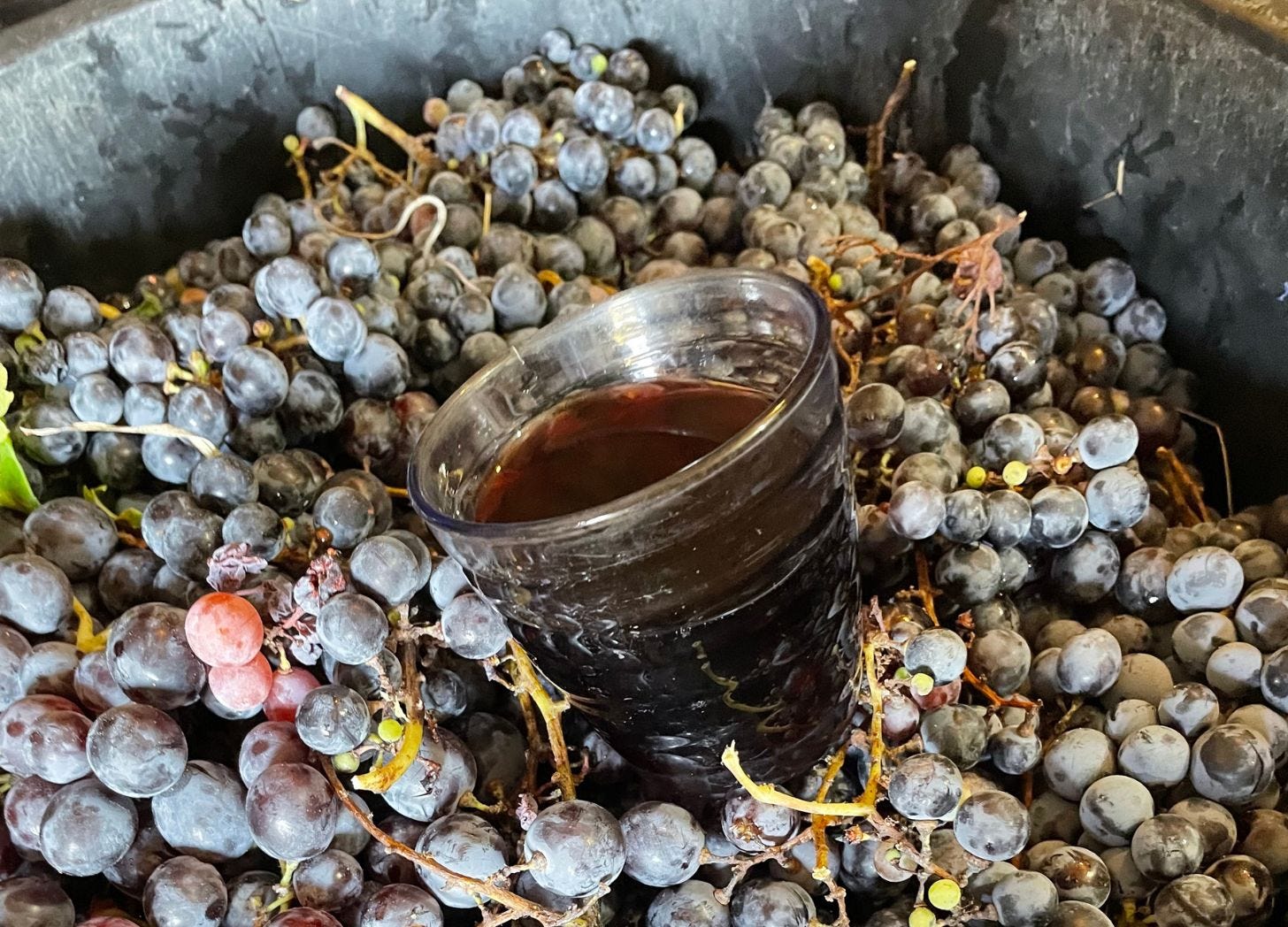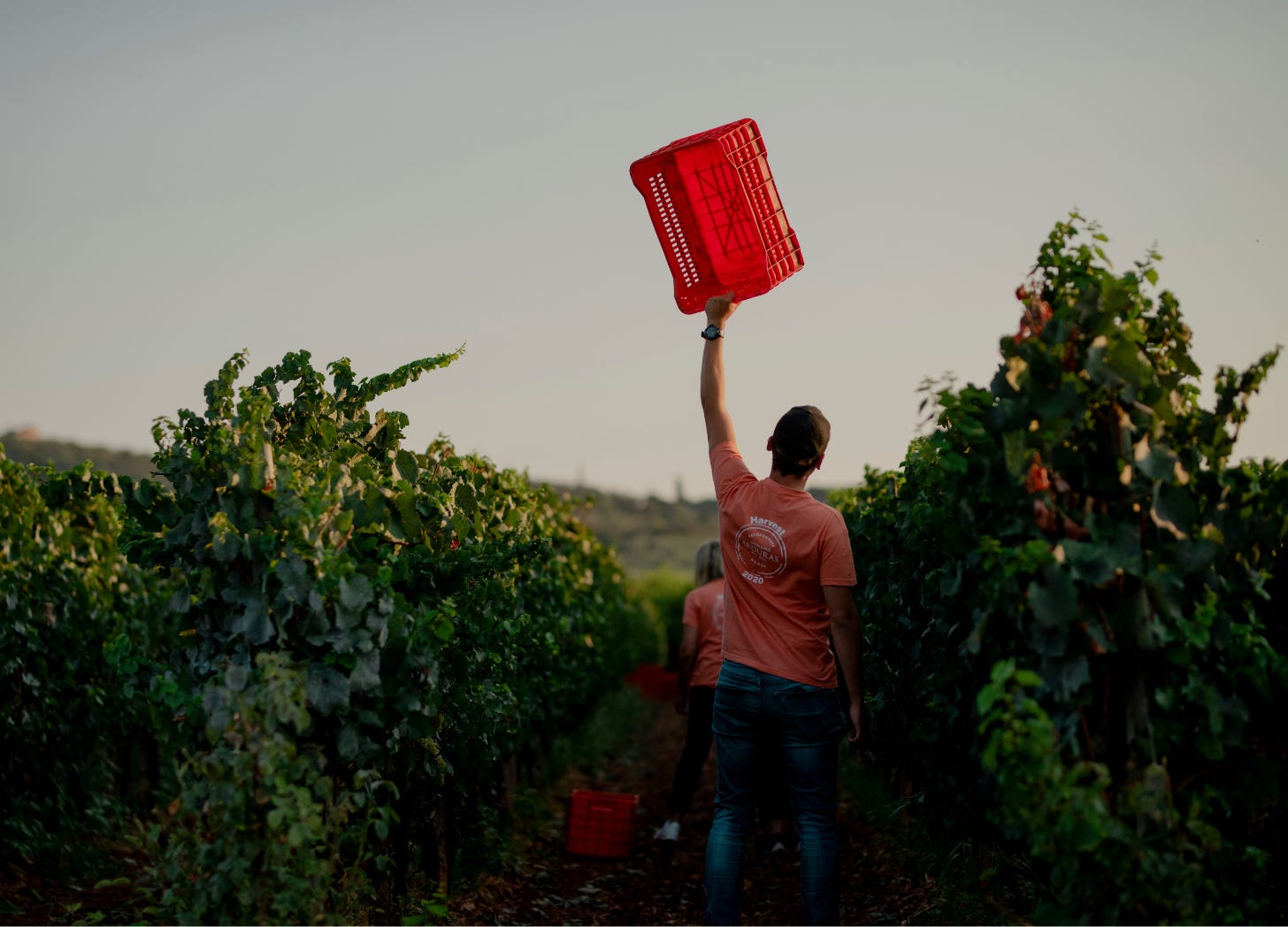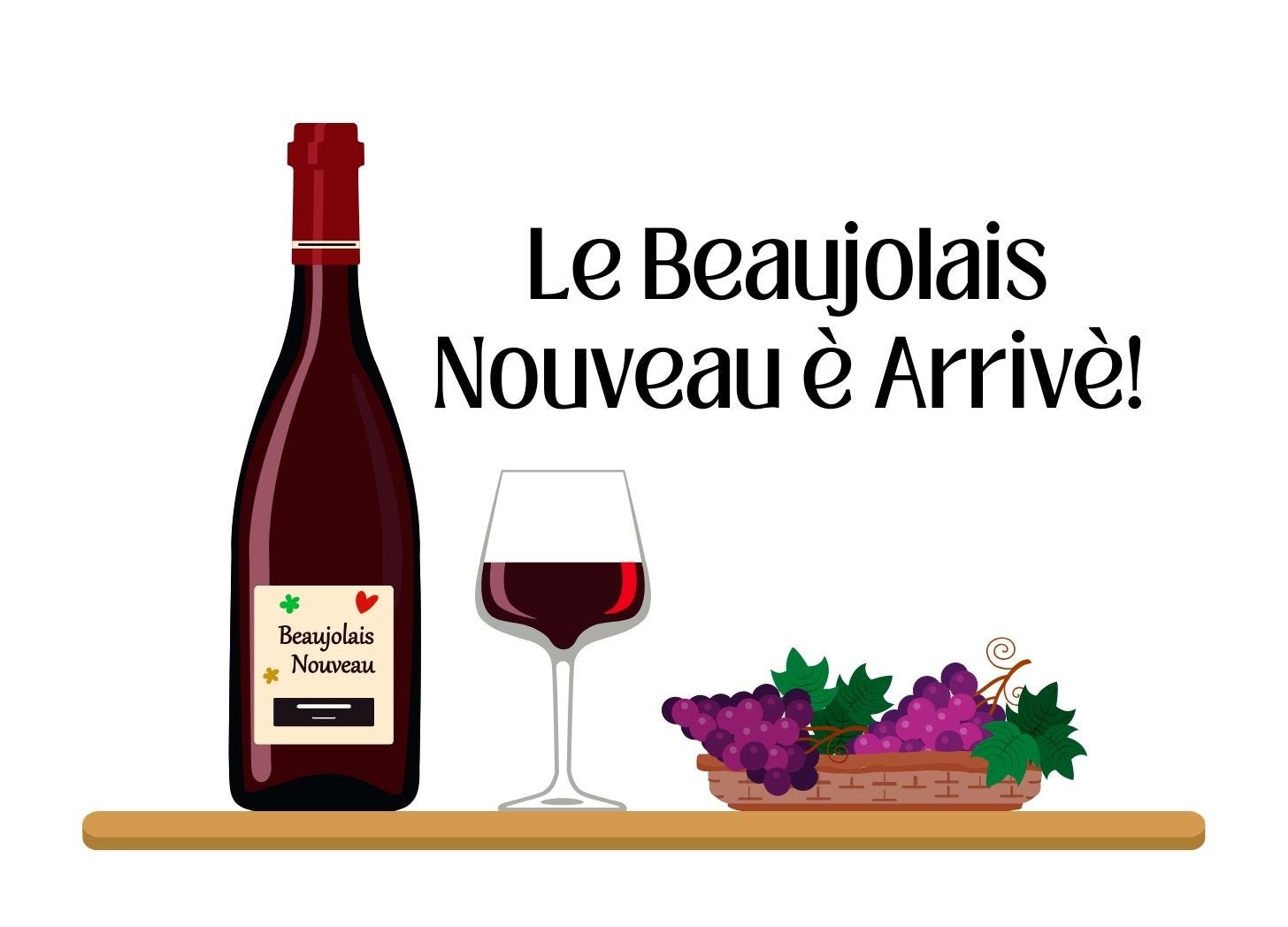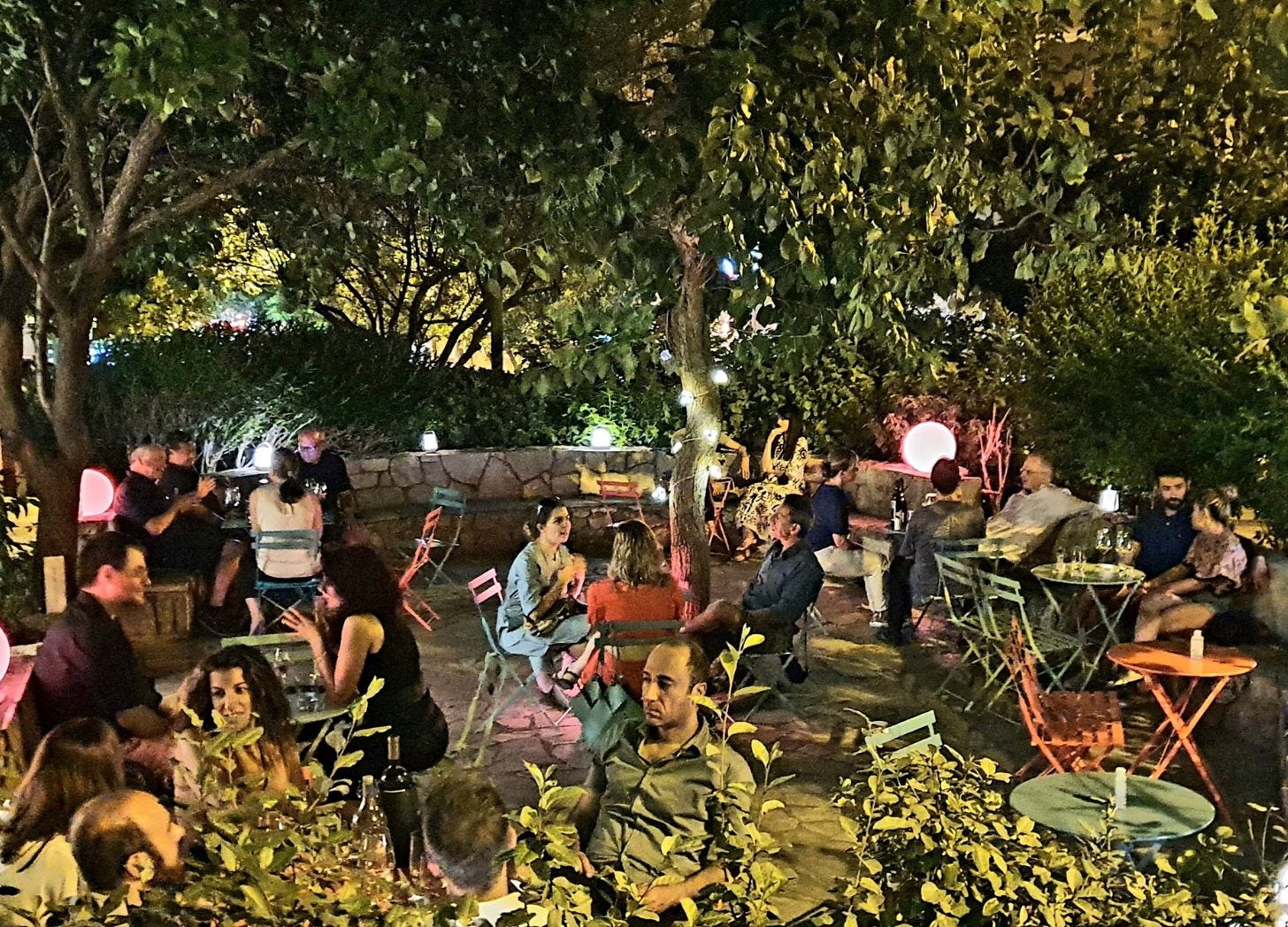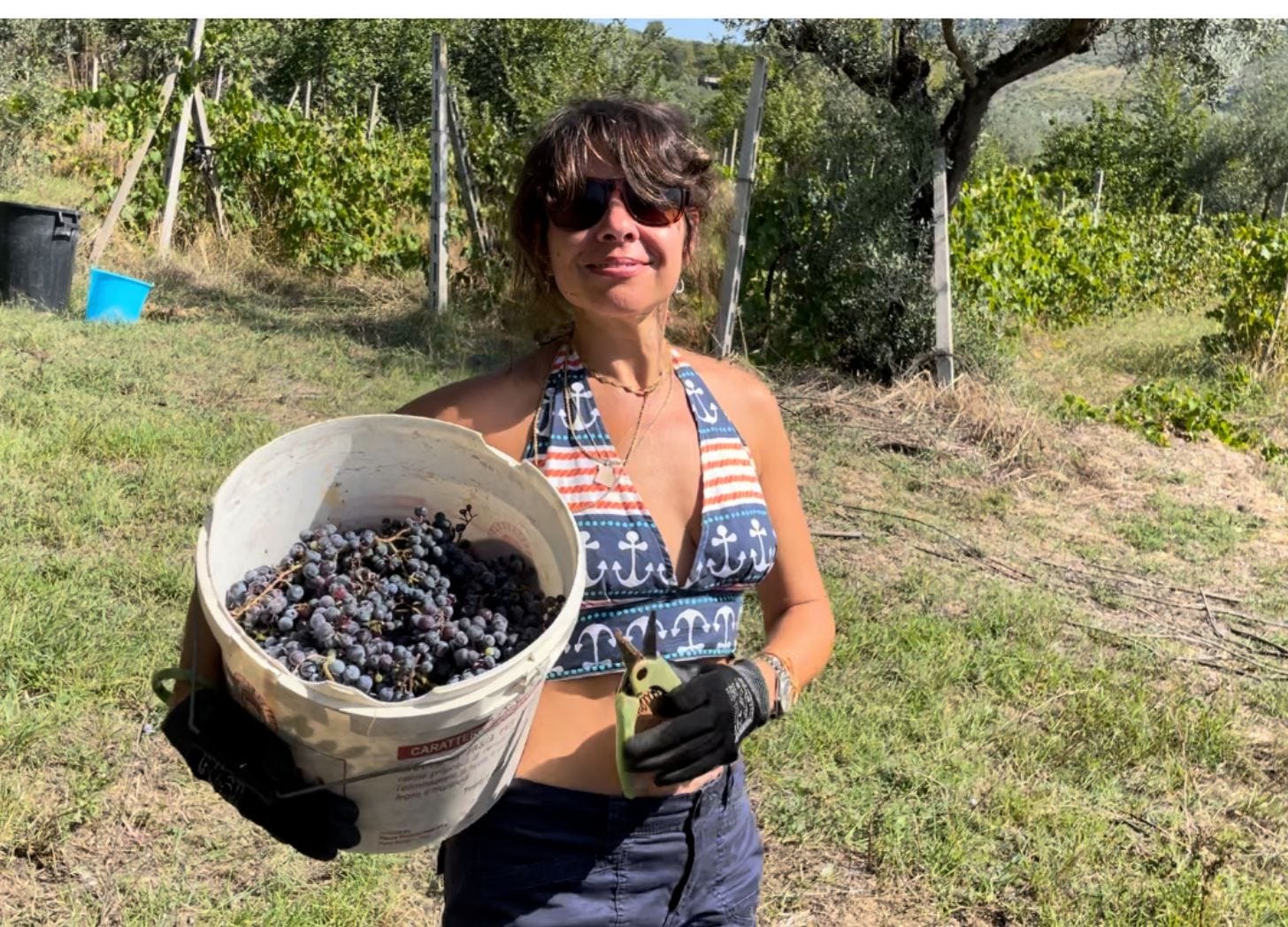Harvest Season: Musings on Life and Death, But Mostly Life
Beaujolais Nouveau è Arrivé! PLUS: DiVine Comedy, wineries on what harvest means to them + my new favorite Athens wine bar and the passionate wine writer behind it, Eleni Kefalopoulou.
Issue #2
Summer is over. Even I will admit it.
The end of summer feels like a little death. We close the door on a long-awaited chapter. We say goodbye to slower paces, lighter workloads, and shorter to-do lists. No more lazy, languorous afternoons.
The End and the Beginning
Autumn brings with it a sense of both anticipation and uncertainty. Dar Williams sings it best.
I long to lose myself to the collective seasonal shift. I envy the excitement of those who “love layering” and will try pumpkin-spice anything, while I struggle with the fact of socks, and miss the feeling of sun on my skin.
Thankfully back-to-school energy still gets my nerdy pulse racing. The Jewish New Year always feels like a perfectly timed moment of reflection.
And of course, it’s harvest season.
You don’t need to be a farmer or a winemaker to feel the impact of harvest season. It’s in the air everywhere. New and different produce in the markets and holidays like Halloween, Sukkot, and Thanksgiving that put new colors and flavors at the center of the celebration.
Every harvest marks the end of a months-long effort. The fruit of one’s labors, collected, counted, and quantified. Harvest is a monetary and necessary step to maintaining an agricultural livelihood, a medal at the end of the marathon.
The same can be said for the wine harvest, but unlike crops, the wine harvest doesn’t end in the vineyard. When wine grapes ripen, they are destined for a much different journey than corn or carrots.
The wine harvest isn’t an end at all.
Sure, harvest punctuates a period of relentless care for the vines, while nervously staring at the sky. Just getting to the harvest can feel like a small miracle.
Once the last grapes are plucked from the vines, winemakers are no longer at the whims of weather, but what is referred to as “the harvest” also comprises the crushing, maceration, and initial fermentation of the grapes.
It’s Not Over ‘Til It’s Over
Plenty can go wrong in the winery. Bacteria can spread, fermentation can start too soon or not start at all. Winemakers do their best to produce a genuine expression of the land and the grape variety, which means treating them with minimal intervention.
Harvest is also the beginning. If we’re lucky. Every year a new wine is born, the tangible soul of the people and the place that brought it to life.
How Do You Say Harvest?
There’s a vocabulary specific the wine harvest in other languages: La Vendemmia (Italian) Les Vendanges (French), La Vendimia (Spanish) all contain the Latin root vinum (wine). The Greek word, Τρύγος has Τρύω (to crush) at its root.
In Their Own Words
Don’t take my word for it.
Three winemakers from the USA, Italy, and Greece share their thoughts on what harvest means to them. Discover harvest rituals, memories from harvests past, and get their insights about what to expect from the 2024 vintage. Read it here.
Le Beaujolais Nouveau è Arrivè!
A successful harvest can only truly be measured a few months later, fresh from the tank.
In the French region of Beaujolais, the arrival of the first round of wine is celebrated on the third Thursday of November, several months after the harvest. November 21st, this year.
The festival marks the official release of the year’s new wine, when winemakers can finally breathe a sigh of relief. It is observed throughout France and at French bistros and brasseries worldwide.
Beaujolais Nouveau wines are traditionally light, bright, fruity, and easy to drink. Most commonly made from the area’s signature red grape, Gamay, they aren’t meant to be scrutinized for complex aromas or aged in a cellar. They are meant to celebrate. Keep that in mind the next time you see one on the shelf or the wine list.
If you’re in Italy, look for vino novello. Less fun marketing, same fun style of wine.
Wine is Life (According to Dante)
Speaking of Italy, Dante uses winemaking as an allegory for the miracle of new life as part of his narrative poem, The Divine Comedy.
Surprisingly, it doesn’t happen in “Paradise.”
The 14th-century masterpiece is regarded as a rigorously religious text, especially concerned with the afterlife, what happens to the soul when it becomes body-less, and where life actually begins.
Toward the end of Purgatorio (Purgatory) Dante (the narrator), Virgil, and their guide, Statius make their way from the sixth terrace of Purgatory (Gluttony) up the mountain toward the seventh terrace of…
Surprise, Surprise. The wine (and life) stuff happens on the way to L U S T!
Click here for your daily dose of DiVine Comedy, and some colorful arguments for the Thanksgiving table if anyone starts talking about abortion after too much whiskey.
Hot Tip: Athens Wine Bar
When I first landed in Athens, eager to test my fledgling Greek skills (Συγγνώμη παιδιά! Sorry guys), taste Greek wines, and meet women in the wine business, more people than I can count pointed me in her direction.
The bar itself is barely 10 square meters in size. Marked by a single wine barrel, it is tucked a few steps below sidewalk level on a quiet corner in the Koukaki district, not far from the Acropolis Museum.
Tables spill out into a triangular, tree-lined plaza, filled with faithful locals and curious and discerning wine drinkers.
Eleni can be found nightly. She circulates and works the “room” al fresco. The embodiment of hospitality, Eleni will happily sit down and chat every time she fills your glass.
Read more about Eleni’s colorful life story, her take on the harvest in Greece and beyond, and some fun fall wine recommendations.
Life After Life.
Two weeks after we buried my mother in 2022, I did my first wine harvest. It wasn’t planned, I just happened to be in the right place at the right time.
I spent hours trampling through neglected vineyards, searching for the roundest ripest berries. I cracked fingernails untangling vines to reveal plump grape bunches and taste-tested them to see if they were maybe Malvasia. Pink-skinned ones that taste like apricot nectar are the clue. I hauled barrels uphill and loaded them onto a truck until I was so sweaty and sticky I stopped caring.
Back in the cellar we put them through a press and stirred the juice into yesterday’s batch.
The moment grapes are picked and crushed, they start to die and decompose. If you ever get the chance to plunge your hand into a vat of fermenting grape must, you can feel the heat it generates and even see the steam. It’s palpable energy.
A transformation of the sprit.
Thanks to what we might call a divine intervention of (wo)man and nature, a new life begins in the form of fermentation. It is in essence, revitalizing.
Vita…lity
Linguists refuse to indulge my etymological romanticism, but the Italian word for grapevines is vite, which is the plural of vita (life).
We collapsed on the cellar floor and poured out last year’s wine straight from the tank. Dirt streaked my shins and I remembered shoveling fresh earth into my mother’s grave not long ago. With each swallow, I felt the sting of vibrant fruit, the same fruit I’d spent all day ripping from its roots.
It flowed into me, proof of life.



